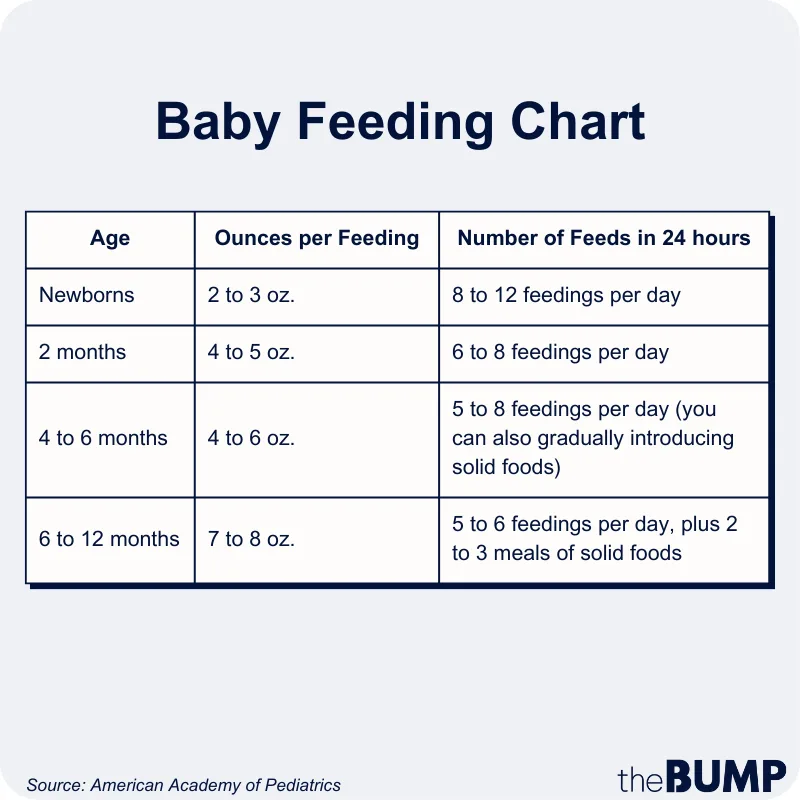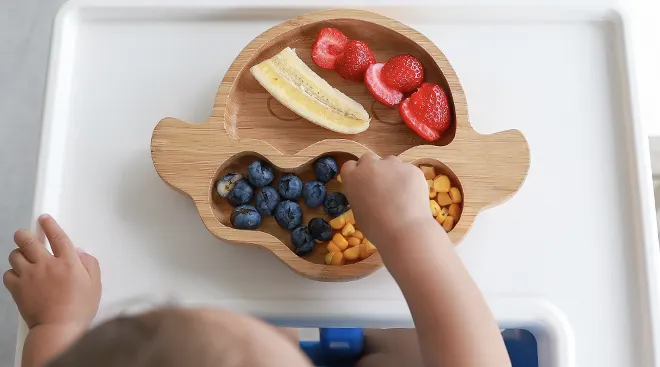Baby Feeding Schedule: How Much Should a Newborn Eat?
If you find yourself fretting over your newborn feeding schedule, you’re not alone. Questions like “how much should a newborn eat?” and “how often do newborns eat?” are some of the most common concerns among new parents. After all, baby is growing by leaps and bounds. In fact, they’ll grow more in the first year than at any other point in their life, doubling in size by the time they’re 5 months old and tripling by the end of the first year—so it’s important to feed baby the fuel they need to power through each stage of development.Whether you opt for breast milk or formula, here’s what you need to know to make sure baby is eating enough.
Wondering how much a newborn should eat? “As pediatricians, we say to feed on demand,” explains Jennifer Trachtenberg, MD, an assistant clinical professor of pediatrics at The Mount Sinai School of Medicine in New York. Breastfeeding may be tricky at first; it’s a new skill for you and baby. But once you get the hang of it, breastfeeding is an ingenious, self-sufficient system. When baby suckles, it stimulates your breasts to produce just the right amount of milk to meet your child’s nutritional needs. When baby needs more (because of a growth spurt, for example), they suckle more, causing your body to crank up production.
However, it’s hard to clock exactly how much a newborn eats when you’re breastfeeding. Luckily, there are guidelines to make sure baby is eating enough. First, identify baby’s hunger cues; these could include rooting, licking their lips, bringing their hand to their mouth, wanting to suck and fussiness, per the American Academy of Pediatrics (AAP).
But how many ounces should a newborn eat at a time? Newborns may only take in up to half an ounce of colostrum (early breast milk) at each feeding during the first couple of days after birth, per the AAP. Over the next few days, they’ll take in 1 to 2 ounces at each feeding. A couple of weeks after birth—once your mature breast milk comes in—baby will likely take in 2 to 3 ounces at each feeding, working their way up to 4 to 5 ounces by the time they’re 2 months old. To gauge roughly how much milk baby needs, try this quick and easy calculation: Multiply baby’s weight by 2.5. For example, an 8-pound baby should be eating about 20 ounces a day. Of course, it’s hard to measure this unless you’re bottle feeding.
How often should a newborn eat while breastfeeding?
It’s important to keep in mind that all babies are unique with different feeding preferences. Some may like to feed more often and take in less milk, while others may like to feed less frequently but take in more milk at each session. In terms of how often you should feed baby, you can expect a newborn to breastfeed as often as every two to three hours (or more!), or up to 8 to 12 times a day, according to the AAP.
Moreover, while baby (and Mom) figure out how to breastfeed, each session can take 20 to 45 minutes or more. Remember, all that suckling helps to establish your milk supply, so it’s time well spent. As baby’s stomach gets bigger and can hold more milk at a time, they’ll be able to go longer stretches between feedings—about three to four hours around the time they’re 2 months old, AAP notes. They’ll also get more efficient at nursing.
My little porkchop is quite the eater. I’m just trying to stay afloat. I don't have enough supply to even store anything—it goes straight to his belly. And he knows when I’m pumping too. Sometimes I’ll offer some formula to hold him over and he just kind of suckles it a bit and then gulps my milk down when I have it ready for him. It’s kind of flattering actually. I just don't remember [my first] eating so much. I had tons and tons of extra milk. [My second] averages about 4 ounces in a sitting, sometimes even 5 ounces, and at night he cluster feeds for a few hours.
One advantage to formula-feeding is that caregivers can actually measure every single ounce of milk baby guzzles down. But it can pose its own challenges too: While infants are blissfully free from concepts like the clean-plate (or empty-bottle) club, parents aren’t and can inadvertently overfeed baby. To help allay any worries, we’re breaking down how much a newborn should eat when formula-feeding.
On average, the correct newborn feeding amount for formula in ounces is around 2.5 times baby’s weight in pounds. (Yes, the total amount that breastfed and formula-fed babies need to eat in a day is roughly the same.) In the meantime, approximately how many ounces should a newborn eat when formula-feeding? In their first week of life, newborns should eat roughly 1 to 2 ounces per feed, building up to 3 to 4 ounces per feed by the time they’re one month old. Expect to add about an ounce per month until baby is eating 6 to 8 ounces of formula at a time; this usually happens when baby’s around 6 months of age. In general, 32 ounces of formula a day is the most baby will ever need, according to the AAP.
Of course, keep in mind that babies’ needs and hunger levels vary. If baby always seems hungry after their feedings (i.e. they’re smacking their lips and acting fussy), bring it up to your pediatrician—they’ll look at baby’s growth curve to make sure everything’s tracking appropriately. It’s possible baby just needs to suck, which can be satisfied with a pacifier—or they may be ready to start eating solids (usually around the four to six-month mark.) Also note that baby might not finish their bottle every time—and that’s okay too. If baby’s fidgeting, distracted or turns away from the bottle, they’re likely full.
How often should a newborn eat while formula-feeding?
The newborn feeding schedule for formula can be a little different than it is for breastfeeding. According to Mount Sinai, babies tend to digest formula more slowly, so they can go longer between feedings. Consequently, formula-fed babies tend to have more regular feeding schedules, and they typically feed every three to four hours, per the AAP.
For moms who combo-feed with breast milk and formula, there are no set rules for how often and how much a newborn should get of each. You’ll want to aim for at least eight feedings per day of one type of milk or the other (this frequency will decrease as baby gets older). Since breast milk and formula are nutritionally similar, it’s simply a matter of finding the mix that works best for you and baby.
We recently switched to No. 2 nipples. Baby can now drink 3 to 4 ounces in 5 to 10 mins. With the No. 1 nipples, it would take about 20 mins—and a lot of the time she’d only take 2 ounces. It was like she got tired of sucking and wouldn't finish her bottles.
Below is a sample newborn feeding schedule for a 24-hour period. Remember, this is a suggestion based on averages. Your baby may have different needs, which can change over time.
Newborn feeding schedule: 0 to 2 months
As noted, newborns will feed up to 12 times a day. “This is because they don’t have much reserve to be able to keep their blood sugar regulated,” explains Denise Scott, MD, an Oklahoma-based pediatrician. “Expect them to sleep between feedings. This means that you may have to wake your infant to feed them if they have slept through a feeding.” Below, an example of what your newborn’s feeding schedule may look like in a 24-hour period.
7 a.m. - baby’s first feeding
9 a.m. - baby’s second feeding
12 p.m. - baby’s third feeding
2 p.m. - baby’s fourth feeding
4 p.m. - baby’s fifth feeding
6 p.m. - baby’s sixth feeding
9 p.m. - baby’s seventh feeding
12 a.m. - baby’s eighth feeding
2 a.m. - baby’s ninth feeding
4 a.m. - baby’s tenth feeding
Baby feeding schedule: 3 to 6 months
As baby begins to gain weight, they’ll eat more during each feeding session and have fewer overall feeds in a day, Scott says. Expect them to eat between six and eight times a day.
7 a.m. - baby’s first feeding
10 a.m. - baby’s second feeding
1 p.m. - baby’s third feeding
4 p.m. - baby’s fourth feeding
7 p.m. - baby’s fifth feeding
11 p.m. - baby’s sixth feeding
3 a.m. - baby’s seventh feeding
Baby feeding schedule: 6 to 9 months
According to Scott, by 6 months most babies have started on solids. These “are digested more slowly, so [babies] can sustain themselves longer between feedings,” she says. In other words, you might be able to drop the nighttime feeds. So how often do infants eat? On average, babies eat two to three meals and nurse or bottle-feed up to six times per day. “By 8 to 9 months, babies will take 24 to 32 ounces of breast milk or formula, and have three solid feedings daily,” Scott adds.
7 a.m. - baby’s first feeding
10 a.m. - baby’s first solid meal
1 p.m. - baby’s second feeding
4 p.m. - baby’s third feeding
7 p.m. - baby’s second solid meal
10 p.m. - baby’s fourth feeding
Baby feeding schedule: 9 to 12 months
By this age, babies should be able to sleep through the night without needing to eat, Scott says. They’ll eat three meals and two to three snacks during the day. “A snack may be a bottle with some finger-foods,” Scott says. You can expect baby to eat up to six times a day in total, with around half of these being servings of bottles or breast milk.
8 a.m. - baby’s first solid meal
11 a.m. - baby’s first bottle or nursing session
1 p.m. - baby’s second solid meal
4 p.m. - baby’s second bottle or nursing session
7 p.m. - baby’s third solid meal
10 p.m. - baby’s second bottle or nursing session
At a year old, your little one can transition to cow’s milk and will only need between 16 and 24 ounces 2 to 3 cups) of milk per day. “More than this can lead to constipation and iron deficiency anemia,” says Scott.
Still wondering how much a newborn should eat, and how often? Refer to the following infant feeding chart, based on information from the AAP and Centers for Disease Control and Prevention (CDC). It breaks down newborn feeding amounts and provides a baby feeding schedule by age.
As mentioned, when baby is around 4 to 6 months old, you can start introducing solid foods into their diet. Keep in mind, though, that this is mostly to expose them to different tastes and textures. Baby’s primary source of nutrition should still be breast milk or formula.
A reminder that, while the above chart provides an average baby feeding schedule, your little one may feed differently based on their unique developmental needs. (For more information on the best initial solid foods for baby, click here.
Babies eat as much or as little as they need. My advice is to not force them to eat more or less than what they want—even if it makes your life a little more difficult.
When it comes to newborns, how often you should feed baby depends on how much breast milk or formula your newborn wants. Again, keep an eye out for signs you have a hungry baby, and pay attention to baby’s cues even while you feed. You’ll know they’re still hungry if they’re actively suckling and audibly swallowing. When baby stops suckling, relaxes their hands and has that sleepy “milk-drunk” look, you’ll know they’ve eaten enough.
Checking baby’s diaper can also give you a clue as to whether baby is getting enough. After baby’s first month, seeing a wet diaper every three to four hours (or five to six wet diapers per day) is a good sign, per the AAP. Stools can be more variable: Some babies poop every time they eat, others just once a day (both are normal)—and it can depend on whether baby primarily drinks breast milk or formula.
At the end of the day, “how baby is acting and growing are the most important [signs],” Trachtenberg says. By measuring baby’s weight gain, your pediatrician will be able to tell if your child is thriving. Babies usually gain about 0.5 to 1 ounces per day for the first three months, but keep in mind that the big picture is more important than any single weigh-in. “In general, you want to see baby’s height and weight basically follow their own growth curve,” says Meryl Newman-Cedar, MD, a New York City-based pediatrician and clinical instructor of pediatrics at Weill-Cornell Medical Center.
Frequently Asked Questions
Should I wake baby for feedings?
This depends on baby’s age and growth patterns. “I tell parents not to wake a sleeping baby,” Trachtenberg says—especially once baby has gained back their birth weight and is continuing to feed every three to four hours during the daytime. (It’s normal for newborns to lose weight in the first few days of life and then gain it back.) However, Scott notes that it may be necessary to wake newborns in the first couple of months to help them keep their blood sugar levels regulated.
Should I wake baby if they doze off during a feeding?
Some doctors say yes. “When that happens, baby eats so slowly that one feeding runs into the next feeding time—and parents find themselves with little time for anything else,” Newman-Cedar says. Try slightly undressing baby, tickling their feet or patting their bottom to get back on task. For breastfed babies, La Leche League notes they may also fall asleep if they have a poor latch and have to work extra hard to get milk. If baby is consistently falling asleep during breastfeeding, reach out to your pediatrician or a lactation consultant for tips and guidance.
Is baby eating too much?
While baby is naturally aware of when they’re hungry and when they’ve had their fill, it’s possible for well-meaning adults to coax baby into overeating, especially from a bottle. To avoid this, watch for signs baby is full, such as turning their head, pushing the bottle away or fussing. And don’t be too focused on making sure baby finishes every last drop. Trachtenberg suggests putting no more than a half-ounce more than you expect baby to eat at each feeding in a bottle. If baby drains that too, you’ll know it’s time to add a little bit more. But go slowly: Try pausing halfway through the bottle, sitting baby up and burping them—then see if they actually want more.
Should I worry that baby is losing weight?
Don’t stress: It’s totally normal for newborns to actually lose weight in the first few days of life—up to 7 to 10 percent is considered acceptable. Beyond that, your doctor may advise you to supplement with formula to ward off dehydration and low blood sugar. If baby isn’t getting enough calories, you’ll also start to see a lag in growth, Newman-Cedar says. It starts with a decrease in baby’s weight, then length and lastly head circumference, since the body prioritizes the brain when nutrients are scarce. But when it comes to baby’s growth, bigger isn’t necessarily better. It’s all about the growth curve. “If you have parents who are thin and the kid is in the 10th percentile, that’s probably normal for that child,” Newman-Cedar says. However, if baby has a fever, is lethargic, refusing to eat, vomiting a lot in between feedings, has dark urine and/or isn’t urinating at least every four to six hours, call your pediatrician right away.
How much weight should newborns gain and when?
As noted, newborns will lose some of their birth weight in the first week or two of life before they start gaining it back. “This is especially true for breastfed babies, since it takes that period of time for the milk to come in,” Scott says. “Bottle-fed babies will begin to gain a little quicker.” Once your newborn does start to regain their weight, they should gain around an ounce a day and around half a pound per week every two to three weeks. As a result, baby should double their birth weight by the time they hit 4 to 5 months and triple it by the time they reach 12 months.
Ultimately, parents want the best for their kids—so, of course, you want to ensure that baby is getting enough to eat. If you’re still confused and questioning exactly how much a newborn should eat, take heart knowing that as long as they’re happy and healthy, baby’s feeding schedule is likely just fine.
Please note: The Bump and the materials and information it contains are not intended to, and do not constitute, medical or other health advice or diagnosis and should not be used as such. You should always consult with a qualified physician or health professional about your specific circumstances.
Plus, more from The Bump:
Meryl Newman-Cedar, MD, is a New York City-based pediatrician at Upper East Side Pediatrics, an assistant attending pediatrician at NewYork-Presbyterian Hospital/Weill Cornell Medical Center and a clinical instructor of pediatrics at Weill Cornell Medical Center. She attended medical school at the SUNY Downstate Medical Center, and completed her residency in pediatrics at NewYork-Presbyterian Hospital/Weill Cornell Medical Center. She has been in private practice since 1986.
Denise Scott, MD, is a pediatrician and pediatric endocrinologist based in Oklahoma with over 20 years of experience. She received her medical degree from the University of Texas Medical Branch and completed her residency at the University of Oklahoma Health Sciences Center, with a fellowship at the National Institutes of Health.
Jennifer Trachtenberg, MD, is a pediatrician with Carnegie Hill Pediatrics in New York City, where she has been practicing for over 20 years, as well as an assistant clinical professor of pediatrics at the Mount Sinai School of Medicine. She earned her medical degree and completed her residency at the Mount Sinai School of Medicine. She’s also the author of two parenting books, The Smart Parent’s Guide: Getting Your Kids Through Checkups, Illnesses and Accidents and Good Kids, Bad Habits: The RealAge Guide to Raising Healthy Children.
Mayo Clinic, Feeding Your Newborn: Tips for New Parents, April 2022
Children’s Hospital of Philadelphia, Breastfeeding Tips for Beginners
Healthy Children (American Academy of Pediatrics), How Often and How Much Should Your Baby Eat?, July 2021
Cleveland Clinic, Colostrum, February 2022
Nutrition in Clinical Practice, Importance of Human Milk for Infants in the Clinical Setting: Updates and Mechanistic Links, October 2023
American Academy of Pediatrics, Newborn and Infant Nutrition, 2023
March of Dimes, Feeding Your Baby Formula, April 2019
Healthy Children (American Academy of Pediatrics), Pacifiers: Satisfying Your Baby’s Needs, December 2012
Cleveland Clinic, Feeding Your Baby: The First Year, September 2023
Mount Sinai, Breastfeeding vs. Formula Feeding, April 2023
Centers for Disease Control and Prevention, How Much and How Often to Feed, April 2022
Academy of Nutrition and Dietetics, Do’s and Don’ts for Baby’s First Foods, March 2021
National Health Service UK, Breastfeeding: Is My Baby Getting Enough Milk?, September 2022
La Leche League, (laleche.org.uk), Sleepy Baby - Why and What to Do, June 2022
Nationwide Children’s, Newborn Warning Signs, October 2023
Learn how we ensure accuracy of our content through our editorial and medical review process.
Navigate forward to interact with the calendar and select a date. Press the question mark key to get the keyboard shortcuts for changing dates.





















































